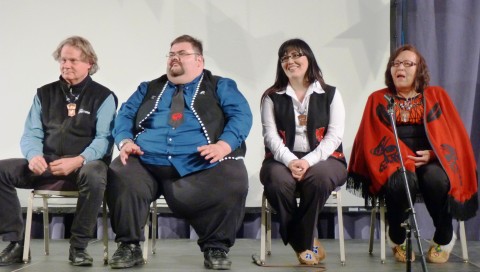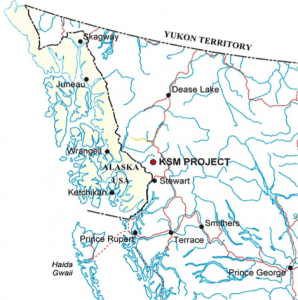
From the left, author and activist Wade Davis, Tlingit-Haida Central Council President Richard Peterson, Tahltan Central Council President Annita McPhee and Tahltan elder Mary Dennis wait to answer questions during a recent forum in Juneau on transboundary mines and the Tahltans’ “Sacred Headwaters.” (Ed Schoenfeld/CoastAlaska)
Tribal leaders from Alaska and Canada say it’s time to work together to oppose mines affecting both sides of the border. It’s part of the growing scrutiny of projects near transboundary rivers.
Parts of Southeast Alaska are only a couple dozen miles from British Columbia. Historically, tribal groups from both sides have met, traded and married.
“Tlingit, Haida, Tsimshian people who live in Alaska all have tribes, clans and relatives on the other side,” says Richard Peterson, president of Southeast’s Central Council of Tlingit and Haida Indian Tribes of Alaska.
He says over the years, many of those connections have been lost.
Now, he says, they’re coming back.
“I’m really excited that we could remove these invisible barriers, this invisible line that they call the border, that somehow successfully separates us so well. We’re doing away with that line,” he says.
Peterson spoke at a recent program in Juneau about traditional life and changes coming to parts of northwestern British Columbia.
The main issue was large mine development, which is being closely watched by tribal leaders.
“We don’t want our livelihood destroyed. We don’t want our watershed destroyed. And it’s a very sacred place to us,” says Annita McPhee, president of the Tahltan Central Council, in northern British Columbia.
Tahltans have brought their message to Southeast Alaska for a number of years. But McPhee says most were not aware of possible impacts on rivers that cross the border.
She says meeting held this spring changed her perspective.
“One of the things I’m prepared to do is go back and carry that message. Back to our people and back to other tribes. And definitely talk to people in industry and say, just because people are on the other side of the border does not mean that it doesn’t impact them,” she says.
Much of the recent focus has been on the KSM, or Kerr-Sulphurets-Mitchell, mine. It’s a gold and copper prospect, roughly 80 miles east of Wrangell, planned by the Canadian firm Seabridge Gold.
Opponents say its tailings could affect the Unuk River, which flows into Behm Canal, north of Ketchikan.
Other mines could be built near the Stikine, Taku, Alsec and Chilkat rivers.
They’re part of a British Columbia-government-backed mining boom.
McPhee says her council has about 250 projects to track – and that’s too many.
“Now that this big storm has come through, we are in a place where we’re getting organized, where we know what we want and we know what we don’t want. And we know what we’ll find acceptable and not unacceptable,” McPhee says.
The Tahltans have experience working with – and battling – big resource development projects on their land. About 10 years ago, they took on a Shell oil plan to frack for gas.
Tahltan elder Mary Dennis was among those blockading a road and to protest that project.
“We had to think of our grandchildren and our great-grandchildren. So we stood up to them. We stood on the line and stopped them,” he says.
McPhee says the Tahltan council does not oppose mining. And it wants to increase economic opportunities for tribal members.
“There were some people who said, we want to work, we want this development, it’s going to pay us a lot of money. Then there were some people who said this is not worth any amount of money in this whole entire world. We don’t care. Take your money back. Our way of life, our animals, our waters, our culture is worth more than that money,” she says.
She says her council has since united on the issue.
Wade Davis is an author, anthropologist and resource consultant who lives in the Tahltan’s homeland.
“One of the things that happens is First Nations, I’m sure here in Alaska as well, are always given this false choice between poverty and economic projects that compromise their heritage. And that’s a choice that no people should be forced to make,” he says.
Tlingit-Haida President Peterson has worked with developers of mines near his Prince of Wales Island home.
He says he was willing to listen when KSM representatives spoke at a tribal meeting in Craig earlier this year. He says those representatives were not interested in listening.
“Every time anybody got up and said anything contrary to them, they snickered, they rolled their eyes, they laughed, they talked. I found them to be the most disrespectable people I’ve ever dealt with. They don’t care,” he says.
The Tlingit-Haida council and some other Southeast groups are lobbying the federal government to get involved in the transboundary mining issue. They want the feds to pressure Canadian officials to listen to tribal concerns.
They’ll take that issue before a National Council of American Indians conference next month in Anchorage. And they’ll bring along support from the other side of the border too.






